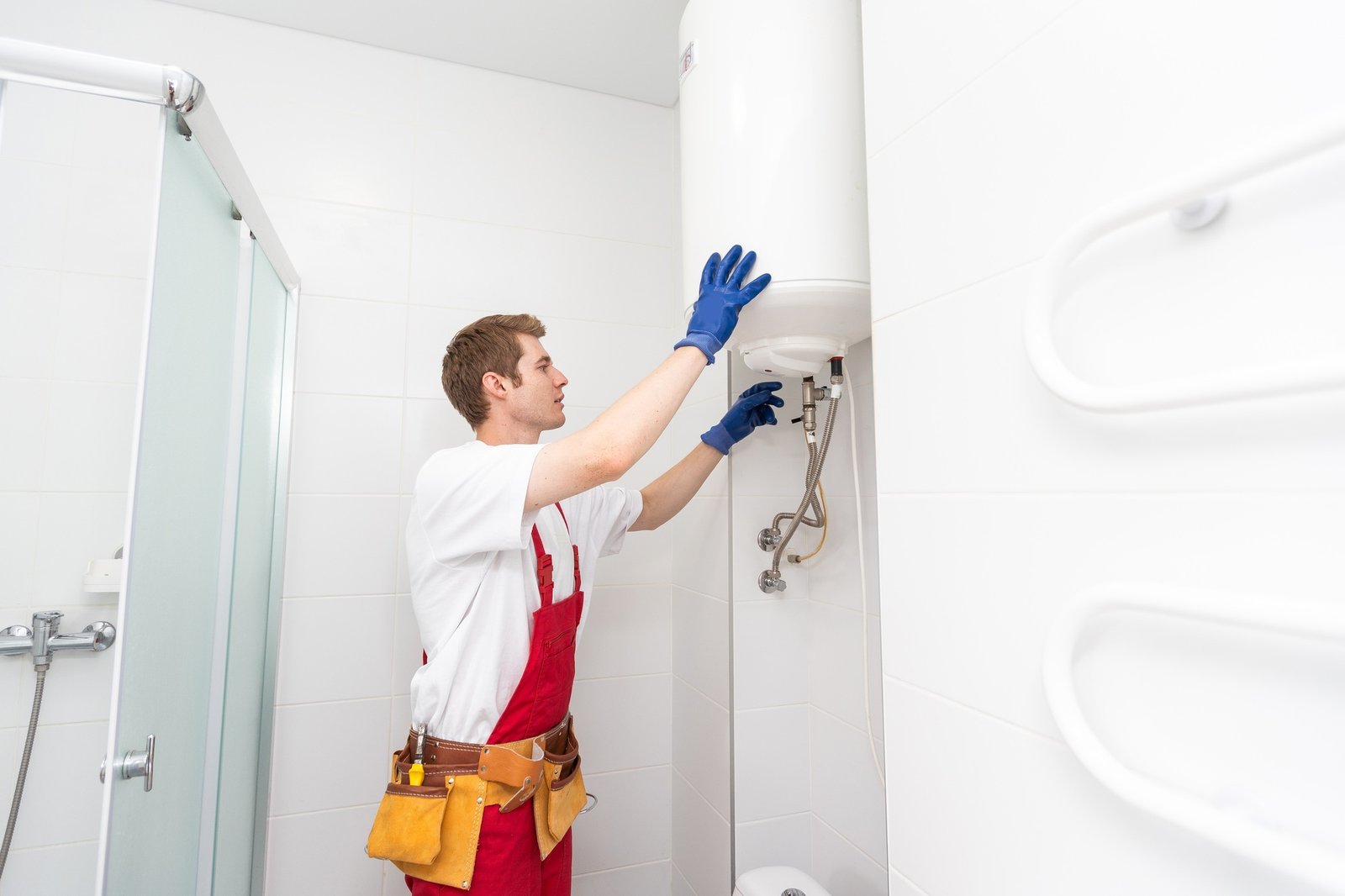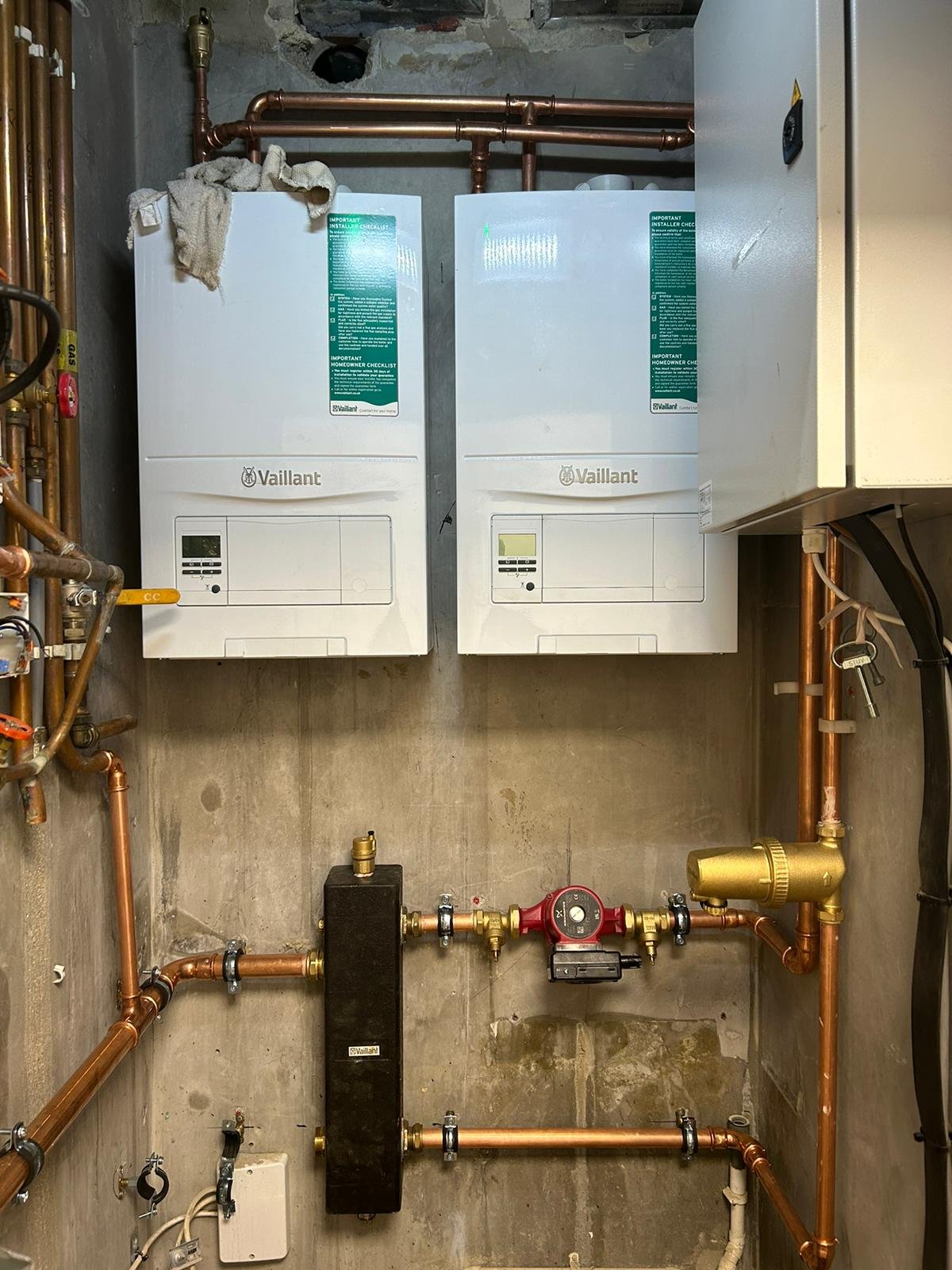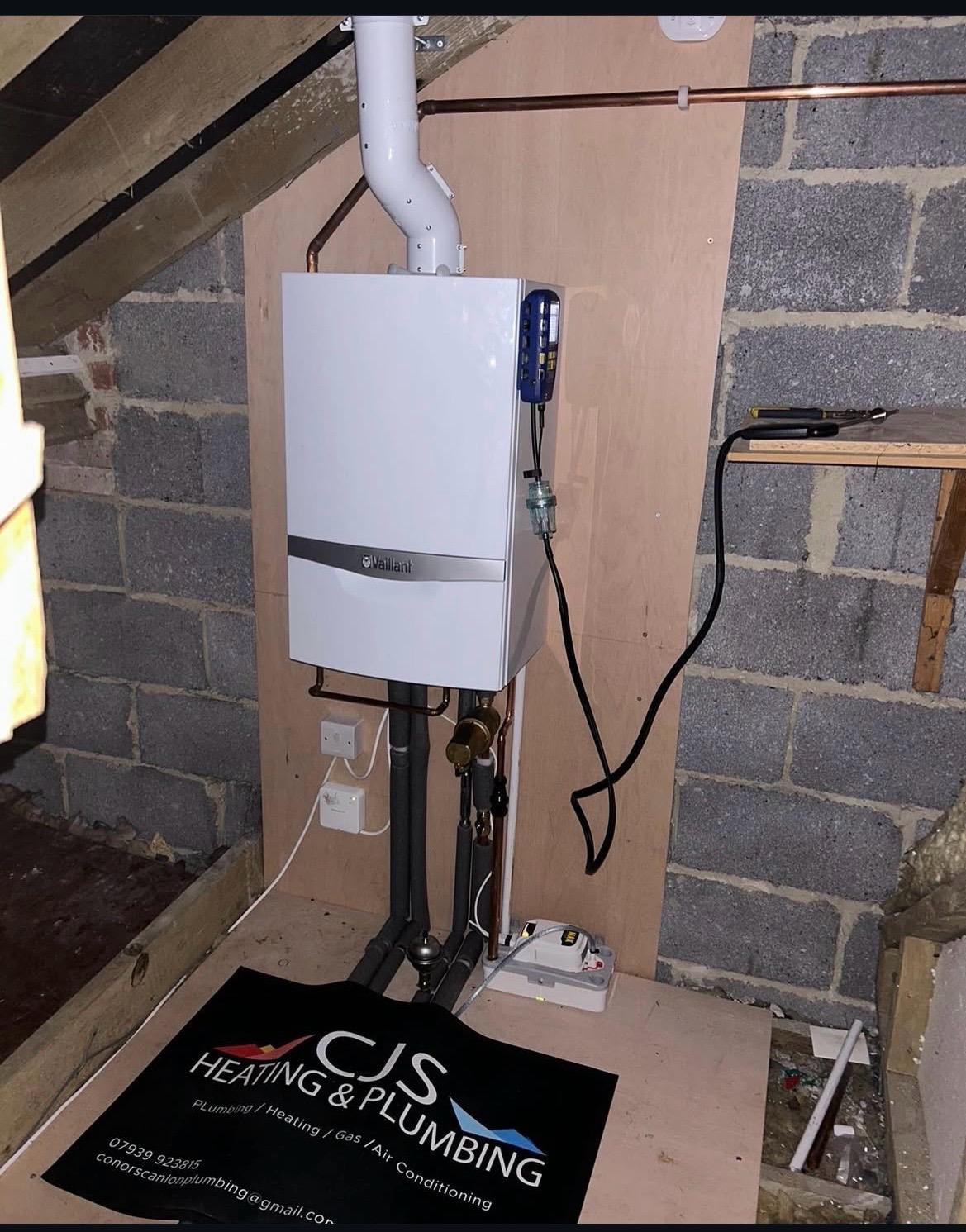A well-functioning boiler is essential for keeping your home warm and your water hot. But if your heating suddenly feels uneven or your boiler stops working efficiently, low pressure could be the reason. Understanding how to know if a boiler has lost pressure is crucial for maintaining both comfort and energy efficiency.
Boiler pressure refers to the balance between water and air inside your heating system. This balance allows your boiler to circulate hot water through the pipes and radiators effectively. When the pressure gauge drops below the recommended range, your system will struggle to operate, often shutting down to prevent internal damage. Typically, a healthy reading is between 1 and 1.5 bar when cold, while anything below 1 bar may indicate a problem.
Book your boiler service with CJS Heating & Plumbing to keep your heating system running safely and efficiently.
What Boiler Pressure Really Means
Boiler pressure is not about gas or temperature; it measures the amount of water and air within your sealed heating system. This pressure ensures that hot water flows smoothly through your radiators and returns to the boiler to be reheated. When your system begins losing pressure, it can no longer circulate water effectively, leading to cold spots, reduced heating output, or even a total system shutdown.
Modern UK boilers rely heavily on consistent pressure to maintain safety and efficiency. A loss of pressure affects both performance and the longevity of components, as the system must work harder to produce heat.
Common Causes of Low Boiler Pressure
There are several reasons your boiler might lose pressure over time. The most common ones include:
- Leaks in the system: Even a small leak in a pipe, radiator, or valve can slowly drain pressure from your boiler.
- Bleeding radiators: Releasing trapped air from your radiators improves heating efficiency but can also lower pressure if not topped up afterward.
- Faulty expansion vessel: The expansion vessel manages pressure changes as water heats and cools. If it fails, your system may lose pressure frequently.
- Open pressure relief valve: When this valve is stuck or open, it allows water to escape, reducing the internal pressure.
It is important to monitor your pressure gauge regularly to ensure your system remains in the safe operating range.
Myths About Low Boiler Pressure
A common misconception is that low pressure always means a leak. While leaks are a frequent cause, other factors such as air in the system, faulty components, or recent maintenance can also contribute. Another myth is that topping up the boiler repeatedly is a fix, it may temporarily restore heat, but constant refilling can cause internal wear and corrosion.
If your system continues losing pressure even after topping up, it’s best to contact a professional heating engineer.
At CJS Heating & Plumbing, we specialise in diagnosing and fixing all kinds of boiler issues, including pressure loss. Reach out today to schedule an inspection or request emergency support.
Subtle and Clear Signs Your Boiler Has Lost Pressure
Your boiler plays a vital role in keeping your home comfortable and efficient, especially during the colder months. But when your boiler pressure drops, it can quickly lead to reduced heating performance, inconsistent hot water, and even long-term system damage. Understanding the subtle and clear signs of pressure loss allows you to act before a small issue turns into an expensive repair.
Gauge Check: What to Look for on Analogue vs. Digital Pressure Gauges
One of the easiest and most reliable ways to check for pressure loss is by looking at the pressure gauge on your boiler. This small but crucial dial shows whether the internal water pressure is within a safe range.
For analogue boilers:
- The gauge needle should rest between 1 and 2 bars when the system is cold.
- If it drops below 1, that’s a clear sign the pressure is too low.
- If it rises above 2.5, the system may be over-pressurised and need professional attention.
For digital boilers:
- The pressure is shown on a digital screen.
- Many models display a low-pressure warning or a flashing symbol when the level drops too far.
- Some may even lock out the system until the correct pressure is restored.
A quick glance at this gauge every few weeks, especially before winter, can save you from inconvenient heating issues later on.
System Performance Clues
Performance changes often reveal that your boiler is losing pressure, even before you see it on the gauge. Low pressure affects how efficiently hot water circulates through your heating system, leading to uneven heating and temperature drops.
Watch out for:
- Radiators that are cold upstairs but warm downstairs
- Slow heating throughout your home
- Fluctuating water temperature when using showers or taps
- A boiler that frequently shuts down or needs resetting
If you notice these patterns, it’s worth checking your pressure gauge right away. Reduced flow in the system not only affects comfort but can also cause the boiler to work harder than it should.
Sound Cues: Gurgling or Bubbling Noises
Strange noises can be another clear indicator of pressure problems. If your boiler or radiators make gurgling, hissing, or bubbling sounds, it’s often due to trapped air pockets interfering with water flow.
Try bleeding your radiators to release trapped air and rebalance the system. If the noises continue after bleeding, there could be a small internal leak or debris buildup that needs a professional inspection.
Regularly listening for changes in how your boiler sounds is a simple but effective way to catch pressure issues early.
Visual Indicators: Leaks and Drips
One of the most obvious signs of pressure loss is visible water leakage around the boiler or its pipework. Even minor drips can lead to a gradual drop in pressure, and if left unchecked, can damage components or nearby surfaces.
Look for:
- Damp patches under or around the boiler
- Corrosion or rust on pipes and joints
- Dripping from the overflow pipe or pressure relief valve
If you find any leaks, avoid simply topping up the pressure, as this only masks the problem temporarily. The leak itself must be fixed to restore stability and prevent future damage.
Error Codes: What They Mean
Modern boilers use smart diagnostics to help you identify faults. If your control panel displays a fault or error message, it may be linked to low pressure. Codes such as F22 (Vaillant) or E119 (Baxi) often indicate that the system has lost pressure or has a leak.
Check your manual for the exact meaning of the code. In many cases, repressurising the system using the filling loop can solve the issue. If the pressure drops again soon after, call a Gas Safe registered engineer, as it may point to a deeper problem like a hidden leak or faulty valve.
Root Causes of Pressure Loss (And How to Spot Each One)
If you’ve noticed your boiler losing pressure, you are not alone. It’s one of the most common issues UK homeowners face, especially during the colder months when heating systems work hardest. While a slight drop in water pressure now and then can be normal, frequent or severe dips often point to an underlying problem that needs attention.
Let’s take a closer look at the key reasons behind pressure loss and how to spot them before they lead to bigger heating problems.
Tiny Leaks, Big Impact
Even a small, almost invisible leak can cause your boiler losing pressure gradually over time. These leaks often occur in hidden spots, like copper joints or radiator valves, and may not be noticeable on the surface. When water escapes from the system, it reduces the pressure inside the boiler, leading to inconsistent heating and frequent system resets.
To check for this, inspect the area around your boiler and radiators for damp patches or corrosion. A professional can use specialised tools to pinpoint leaks that aren’t visible to the naked eye.
Bleeding Radiators
Bleeding your radiators helps remove trapped air, but it can also temporarily cause the boiler lose pressure. Every time you release air from the system, a bit of water pressure drops too. While this is normal after maintenance, forgetting to top up the system afterward can result in cold spots or weak heating performance.
After bleeding your radiators, always check the pressure gauge on your boiler. If it falls below 1 bar, it’s time to re-pressurise your system using the filling loop as per your manufacturer’s instructions.
Pressure Relief Valve Discharge
Your boiler’s pressure relief valve is a safety feature that releases water when the system pressure becomes too high. However, if this valve opens too frequently, it can lead to a gradual drop in pressure later on. The valve can sometimes get stuck partially open due to debris or wear and tear, allowing small amounts of water to escape continuously.
If you notice a small puddle near the boiler’s discharge pipe, contact a Gas Safe registered engineer to inspect and replace the valve if necessary.
Expansion Vessel Failure
Think of the expansion vessel as your boiler’s shock absorber. It helps balance pressure inside the system as water expands and contracts with temperature changes. When the vessel’s internal diaphragm fails or loses its charge, it can no longer regulate pressure properly. This often causes the system to fluctuate, rising when hot, then dropping too low once cooled.
A technician can check the vessel’s air pressure and recharge or replace it if needed. Ignoring this issue can strain other boiler components and lead to costly repairs.
Seasonal Changes
Cold weather, long periods of inactivity, or sudden temperature fluctuations can all affect internal seals, causing pressure changes. During winter, water inside pipes can slightly contract, resulting in lower readings. In summer, unused boilers may develop dried seals that allow slow leaks once they’re turned back on.
Regular maintenance and occasional system runs, even in warmer months, can help keep seals flexible and prevent unexpected drops in pressure.
Pressure Loss Diagnosis Table
| Symptom | Likely Cause | Suggested Action |
| Pressure drops slowly over days | Hidden leak in pipework or radiator | Check for visible leaks; call a professional |
| Pressure drops right after bleeding radiators | Air removed from system | Refill via the filling loop |
| Water leaking from discharge pipe | Faulty pressure relief valve | Have a Gas Safe engineer inspect or replace it |
| Pressure fluctuates with temperature | Expansion vessel issue | Test and recharge or replace vessel |
| Low pressure after long inactivity | Dried seals or minor leaks | Run boiler periodically; schedule service |
Keeping your boiler pressure steady is essential for both performance and efficiency. If you suspect your boiler is losing pressure frequently, don’t ignore it, schedule an inspection with a qualified engineer. Identifying the cause early can prevent damage and keep your heating system running smoothly throughout the year.
Fixing Low Boiler Pressure Safely (And Preventing It in the Future)
If your heating suddenly feels weak or your radiators are taking longer to warm up, the culprit might be low boiler pressure. It’s one of the most common boiler issues in UK homes, but the good news is that it’s usually simple to fix, if you know what you’re doing. Handling it safely, however, is crucial. Attempting to increase pressure incorrectly can lead to leaks, system damage, or even voided warranties.
Step-by-Step: How to Re-pressurise Using the Filling Loop
Most modern boilers have a pressure gauge on the front panel. This shows your system’s current pressure level, typically measured in bars. The ideal reading is usually between 1.0 and 1.5 bar when the system is cold. If it’s below 1.0, your boiler is losing pressure and may shut down for safety reasons.
To re-pressurise safely:
- Turn off your boiler. Let it cool down completely before touching any valves.
- Locate the filling loop. This is usually a small silver hose with two valves, found beneath the boiler.
- Open both valves slowly. You’ll hear water entering the system, keep an eye on the pressure gauge as it rises.
- Stop at 1.5 bar. Close both valves once the pressure is back to normal.
- Turn the boiler back on and check for leaks or any error messages.
Be careful not to overfill the system. Excessive pressure can damage internal components or trigger the safety release valve.
When to Call a Professional
If your boiler continues to lose pressure frequently after re-pressurising, it could point to a deeper issue such as a hidden leak, a faulty valve, or a damaged expansion vessel. These are not DIY fixes. In such cases, it’s best to call a Gas Safe-registered engineer who can inspect the system thoroughly and repair it safely.
You should also call a professional if the pressure keeps fluctuating or if you notice water pooling around your boiler. Consistent boiler pressure instability is often a sign of worn components that need expert attention.
Preventative Care for Long-Term Stability
Preventing low pressure is much easier than constantly fixing it. Regular maintenance is the key. Make it a habit to check your pressure gauge every few weeks, especially during colder months when your system works harder.
Book an annual boiler service with a qualified engineer to ensure everything runs smoothly. A service includes leak detection, valve checks, and internal cleaning, all of which help maintain steady pressure and prevent future breakdowns.
Even small leaks in your radiators or pipework can gradually cause pressure loss. Catching these early saves you both money and stress.
Efficiency and Eco Benefits
Stable pressure isn’t just about comfort, it directly affects your boiler’s performance and your heating bills. A system that maintains the right pressure operates more efficiently, meaning your home heats up faster and uses less energy.
Maintaining proper pressure also extends your boiler’s lifespan. By keeping it within the optimal range, you reduce strain on the pump and heat exchanger, which helps prevent costly repairs or premature replacement.
From an environmental standpoint, correct pressure helps reduce energy waste and lower carbon emissions. Regular maintenance and mindful checks are small actions that have a big impact on both your comfort and your carbon footprint.
How CJS Heating & Plumbing Can Help
Keeping your boiler pressure steady doesn’t have to be stressful. If you notice your system losing pressure or the pressure gauge dipping, it’s a good idea to take action before it turns into a bigger problem. CJS Heating & Plumbing is here to help with boiler installations, repairs, and servicing, plus full heating system maintenance and emergency plumbing for homes, offices, and industrial spaces.
Our friendly team can safely re-pressurise your boiler, spot leaks early, and make sure your system stays efficient all year. Don’t wait for a breakdown. Give us a call at 07939 923815 or email info@cjs-heatingandplumbing.co.uk and let us keep your heating running smoothly.





